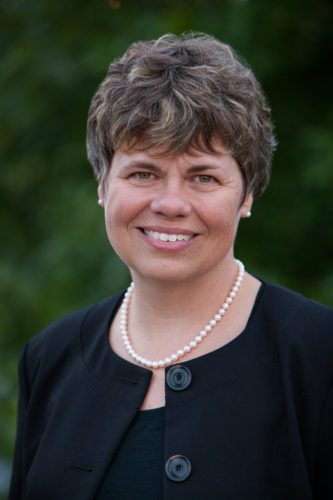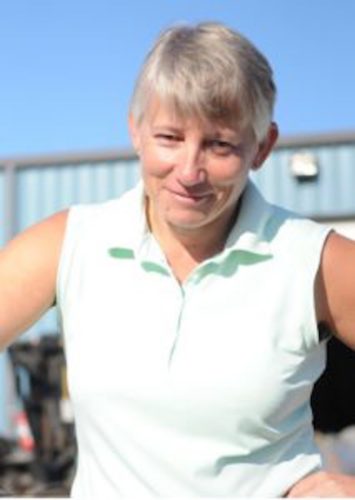 The vibrant lives of 14 young women, and all the potential they held, were lost 30 years ago during the École Polytechnique massacre in Montreal. Twelve of the 14 who died were engineering students. On Dec. 6 each year, the victims are mourned.
The vibrant lives of 14 young women, and all the potential they held, were lost 30 years ago during the École Polytechnique massacre in Montreal. Twelve of the 14 who died were engineering students. On Dec. 6 each year, the victims are mourned.
A new national initiative spearheaded by Mary Wells, dean of the College of Engineering and Physical Sciences at the University of Guelph, and Suzanne Kresta, dean of the College of Engineering at the University of Saskatchewan, will honour those victims in a powerful way this year.
Their new online project celebrates women who studied engineering three decades ago and who have since thrived in the profession.
Many engineering students who were contemporaries of those who died went on to fulfill their potential despite the grief and trauma they experienced from the appalling event, Wells said. They are examples of courage, resilience and strength, she added, and it is important to celebrate their achievements.
“They stayed the course, they moved forward. They found a way to live with it forever but to make something positive from it and have a positive effect as engineers,” Wells said.
As chair of the public policy committee of Engineering Deans Canada, she saw a need for a special commemoration to mark the 30th anniversary of the massacre.
Wells and Kresta initiated “30 Years Later,” an awareness campaign that highlights the accomplishments of 30 women who attended Canadian engineering schools around the time of the massacre. Despite being deeply affected by the tragedy, each grad pursued an engineering career and realized her potential, making extraordinary contributions to the profession, Wells said.

“I think that when you face such emotional tragedy, such horrific things, it embeds itself emotionally within you,” she said. “And it is something that is just always going to be a part of you.”
The fact that women were targeted by the anti-feminist gunman on Dec. 6, 1989, traumatized women engineering students across the country. For Wells and Kresta, both of whom studied engineering in the 1980s, the tragedy instilled not only deep sorrow but also a profound sense of responsibility.
“I asked myself how I would help to effect positive change, especially for women in engineering,” Wells said. “I think it made many of us very strong advocates for changing the profession, getting more women in engineering and diversifying the field.”
The profiles of the 30 engineers – including Nathalie Provost, who was injured in the shooting – will go live on Dec. 4 at www.30yearslater.ca and in the French language at www.30ansplustard.ca. The permanent websites were designed and built by Engineers Canada, the national organization of engineering regulators.
“The lost potential in a single young life is so heart-rending, and these profiles – highlighting how much these women have accomplished in their careers – are a vivid illustration of what we mean by that lost potential,” Kresta said. “We honour the victims in a very concrete and measurable way.”

The inspiring profiles, she added, are also a way to promote the engineering profession to young students and the general public – to show just how remarkable a life in engineering can be.
“I want all of my students to believe in what is possible,” Kresta added. “I want them to reach out to fulfill their own highest truth and to believe in themselves not only as brilliant young professionals but as worthy human beings who are part of a community of friends and colleagues.”
30 Years Later represents a different lens through which to view the Montreal massacre, Wells said.
“It is a way to move forward in terms of lives that were impacted yet stayed the course, that went on to mentor the next generation of students and achieve significant accomplishments as engineers.”

Representing the University of Guelph in the project is Jane Gowing, who graduated in 1986 with a B.Sc. in water resources engineering. In 1998, she founded Gowing Contractors, a major Ontario mechanical contractor in municipal water and waste water. At U of G, she played varsity hockey and field hockey.
In 1990, the year following the École Polytechnique massacre, she worked with the Canadian folk duo Open Mind on a song called Give Us Back the Night. Intended as a memorial to the victims and a call to action, the project was supported by U of G.
Gowing’s company grew threefold in its first five years of operation and continued to grow for years afterward. A multiple award-winning entrepreneur, Gowing was named to the WXN Canada’s Top 100 Most Powerful Women list in 2009.
“As I read through these stories, I was struck by how diverse the achievements, interests and career paths are – and by how frequently our generation of engineers was specifically focused on expanding both the impact of women on the profession and the recruitment of more women into the profession,” said Kresta. “If 30 or 300 or 3,000 young women see themselves in one of these stories and leave stronger, braver and more able to see their future, we will have succeeded.”
An op-ed co-written by Kresta and Wells about the 30th anniversary of the Montreal massacre will be published in the Toronto Star on Dec. 6.
U of G’s School of Engineering will hold its annual memorial on Friday.